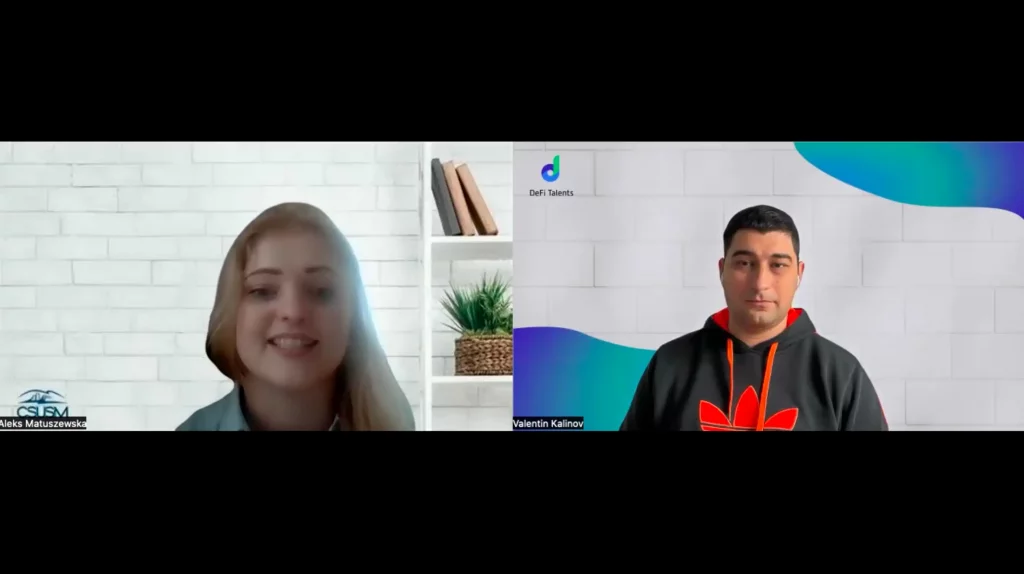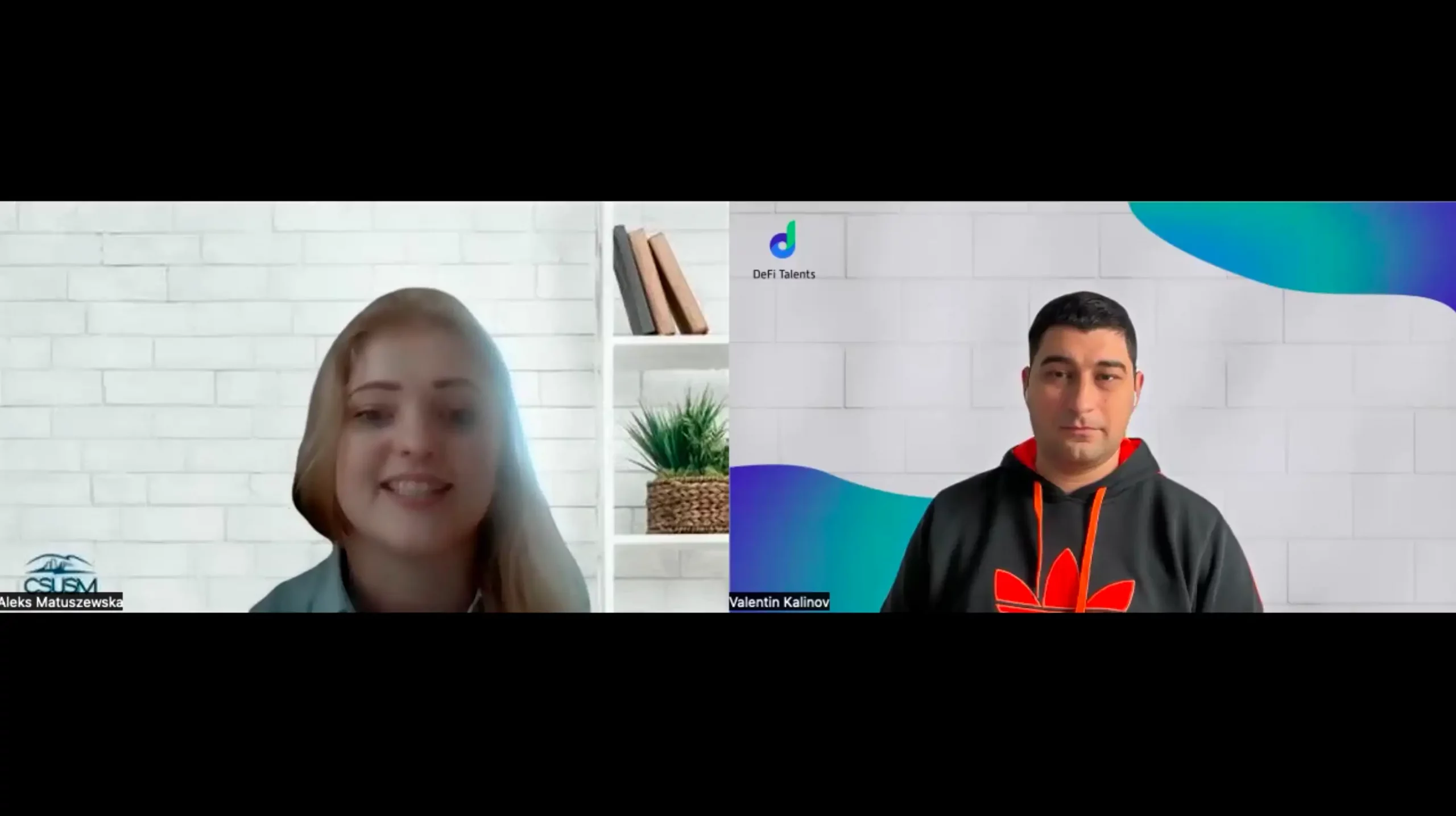
*The text version of the interview has been optimized for reading. Please refer to the audio recording for the full interview
Introduction
Valentin: Hello, everyone. My name is Valentin, and I’m a Project Manager at Web3 Talents, where I focus on the DeFi Talents program. Today, I have a great guest, Aleksandra, who is a fellow Supertalent from our fifth cohort, which ended in February 2024. We invited her for a short interview to discuss her experience and thoughts on crypto—specifically DeFi—and explore some other questions. Aleks, if you would, please give us a brief introduction to yourself, and then I’ll kick off with the first question.
Aleksandra: Absolutely. Thank you, Valentin, for hosting me. I’m grateful to you for organizing the DeFi Talents and all the Web3 Talents programs. It’s an amazing initiative and program that has benefited my personal and professional career. I’m Aleksandra, and I’ve been working for the past two years in the digital asset space within traditional financial institutions. I learned about the DeFi Talents program through a coworker who recommended it to me. I joined and was fortunate to be chosen as a participant. Thank you for inviting me, and I’m looking forward to our conversation.
Choosing the DeFi Talents Program
Valentin: Thank you for that great intro. You’ve already covered some of the topics I wanted to ask about. Your friend recommended the program, but did you just jump right in, or did you research other programs as well? What made you choose this program?
Aleksandra: It was a recommendation from a colleague, and one of the big things about this program is its affiliation with the Frankfurt School of Finance and Management. I started working in Frankfurt with Goldman Sachs, and I’m currently with Accenture. In both institutions, the Frankfurt School is highly regarded, and the blockchain center of the school caught my attention. I also looked at the professionally developed curriculum, which explained what we would do. It was important for me to see if the program was just basics or if it allowed us to explore our own professional focus areas. The program was well-designed, with the first phase covering basics, the second phase focusing on chosen areas, and the third phase involving a major project or code writing in our specialized area. The program’s long-established nature also built trust, and I was excited to apply and be chosen to participate.
Key Experiences and Challenges
Valentin: That’s great. You mentioned the DLT Talents program. Since you have experience with both, what would you say was the most challenging part of the cohorts? Was it an assignment, project, or something else?
Aleksandra: Most of the assignments were challenging, depending on how deeply we wanted to delve into the topics. The assignment that was both challenging and developing for me was the interview assignment. We were asked to interview an expert in the field.
Although I had a limited network in DeFi, I saw this assignment as an opportunity to expand it. I reached out to a contact who recommended Mo, the CEO and co-founder of Mondial and AI. He was an early Bitcoin miner, and now he has an exciting metaverse project. The assignment encouraged me to develop my network, which has continued to grow. The program accelerated my professional development, and the assignment helped me hone my recording skills as well.
Continuous Engagement with DeFi
Valentin: Networking is a big focus of our programs at Web3 Talents because we believe it makes the difference in the crypto space. You’ve taken the right steps in expanding your network. Even though you’re not currently involved in DeFi, do you still follow the space or have an interest in the latest protocols and news in crypto?
Aleksandra: Yes, I still follow the space. Recently, I attended a DeFi meeting for enthusiasts and founders. I just left a project focused on digital assets, and I see the DLT DeFi space shaping my life in the long term. I’ve taken this time to build connections, speak with founders, and explore trends. Web3 involves only about 3% of the population, so there’s vast potential for expansion.
Valentin: We often say we’re still early, but adoption has been slow. Do you have a favorite topic in the crypto space, like DeFi lending, staking, or NFTs?
Aleksandra: My biggest interest is adoption, particularly of DeFi and crypto. I’m enthusiastic about spreading these concepts as widely as possible, especially to professionals who want to upskill quickly. We’re seeing significant development in traditional financial institutions, particularly in Germany, where regulations like the WpHG enable the creation of digital assets. Web3 is about personal freedom, and projects like Mo’s metaverse enable people to create their own spaces. I’m focused on widespread adoption and on making this space more secure.
Perspectives on Crypto Adoption and Regulation
Valentin: You mentioned regulation. Do you think we need stronger, stricter regulations, or more flexible ones for wider adoption?
Aleksandra: I think we need widespread regulation defining what’s possible and providing legal bases for crypto and DeFi.
Without legal security, many players won’t enter the space. Regulation should focus on making the space secure without restricting freedoms, allowing for crypto and DeFi to flourish with mechanisms that encourage participation.
Advice for Prospective Participants
Valentin: Fragmentation is a huge topic. I agree. As we approach the end of our interview, I have an important question for future program candidates. Based on your experience, what advice would you give someone hesitant about joining but wanting to learn DeFi, even as a beginner?
Aleksandra: The first phase of the program covers the basics, so even if you know nothing apart from the existence of Bitcoin, you’ll be fine. The program is structured to allow you to specialize in your professional or personal interests. It’s pre-designed with critical concepts, allowing you to focus on what’s important.
I found the program to be encouraging, manageable, and worthwhile for anyone interested in learning more.
Valentin: I totally agree. It’s a self-learning program, so you can set your own pace. We encourage anyone interested to jump in. It’s not the end of the world if you can’t understand some concepts. The network of peers allows for discussion, questions, and shared learning. Thank you, Aleks. If you have any last words or projects to share, the stage is yours.
Aleksandra: First of all, I’d like to thank you, Valentin, and everyone involved in the DeFi Talents, Web3 Talents, and the Blockchain Center. It’s been an amazing journey of self-development, guidance, and mentorship.
This experience will impact the rest of my life, personally and professionally.
Valentin: Thank you for your kind words.


